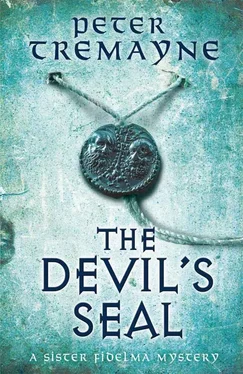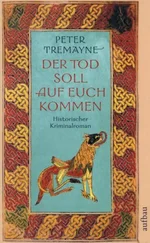Peter Tremayne - The Devil's seal
Здесь есть возможность читать онлайн «Peter Tremayne - The Devil's seal» весь текст электронной книги совершенно бесплатно (целиком полную версию без сокращений). В некоторых случаях можно слушать аудио, скачать через торрент в формате fb2 и присутствует краткое содержание. Год выпуска: 2014, ISBN: 2014, Издательство: Hachette UK, Жанр: Исторический детектив, на английском языке. Описание произведения, (предисловие) а так же отзывы посетителей доступны на портале библиотеки ЛибКат.
- Название:The Devil's seal
- Автор:
- Издательство:Hachette UK
- Жанр:
- Год:2014
- ISBN:9781472208330
- Рейтинг книги:3 / 5. Голосов: 1
-
Избранное:Добавить в избранное
- Отзывы:
-
Ваша оценка:
- 60
- 1
- 2
- 3
- 4
- 5
The Devil's seal: краткое содержание, описание и аннотация
Предлагаем к чтению аннотацию, описание, краткое содержание или предисловие (зависит от того, что написал сам автор книги «The Devil's seal»). Если вы не нашли необходимую информацию о книге — напишите в комментариях, мы постараемся отыскать её.
The Devil's seal — читать онлайн бесплатно полную книгу (весь текст) целиком
Ниже представлен текст книги, разбитый по страницам. Система сохранения места последней прочитанной страницы, позволяет с удобством читать онлайн бесплатно книгу «The Devil's seal», без необходимости каждый раз заново искать на чём Вы остановились. Поставьте закладку, и сможете в любой момент перейти на страницу, на которой закончили чтение.
Интервал:
Закладка:
‘Why so?’ Fidelma asked.
‘Because Cill Dara is a. . what do you call a mixed house of men and women and their children? There is both an abbess and an abbot. I am told that Abbot Máel Dobarchon is currently answerable to Abbess Gnáthnat who is regarded as the true successor of the Blessed Brigit. Now that would make the senior cleric in these kingdoms a woman. That is a preposterous idea!’
‘To your way of thinking,’ Fidelma responded spiritedly.
‘So who else could come forward to claim the Archbishop’s title in the Five Kingdoms?’ the Venerable Verax asked.
Abbot Ségdae turned to his steward, Brother Madagan, who had been silent. The steward cleared his throat as he realised he was expected to answer the question.
‘I would presume that Abbot Colmán Cass of Cluain Mic Nois, where many of the kings of that place are buried. They would have as much right as any. But if you are here to discover who has the better claim to be Archbishop over all the Five Kingdoms, then you will have a hard task. In spite of what the abbots of Ard Macha have written to Rome — for we know they have already done so — there are many among all Five Kingdoms who would dispute their claim.’
The Venerable Verax considered the matter. ‘But rising from such disputes, you might say that there are some bishops or abbots here who would give much to show that they were endowed with the blessing of such an office by the Bishop of Rome himself?’ The question was directed at Abbot Ségdae.
‘I am not sure that any abbot of the Five Kingdoms would consider it necessary,’ Abbot Ségdae replied with a brief smile. ‘The Bishop of Rome is recognised as senior bishop of the Faith as a courtesy, for it was in Rome, so we are told, that the foundations of the Faith were laid and from where the teachings spread through the world.’
‘But you would agree that such recognition by Rome would be valuable to support such a claim?’
Abbot Ségdae shrugged. ‘I suppose it would be considered worth something. However, at the moment it is only Abbot Ségéne of Ard Macha who seems intent on getting recognition from Rome of such a title. For the rest of us, what is more meaningful is being comarb — successor — to the first of our blessed teachers.’
The Venerable Verax sat back, nodding thoughtfully. ‘But still valuable?’ he asked softly.
‘Such recognition would influence some,’ conceded the abbot.
There was a silence and then the Venerable Verax stood up and inclined his head towards the King. ‘The day grows late and I must prepare for this feast and entertainment that you are so kindly providing for our poor inquisitive deputation. Do I have your permission to retire?’
Colgú was looking bewildered. ‘So this was the purpose of your delegation? You have come to enquire about our views on whether we would accept an Archbishop from Canterbury or support the establishment of our own Chief Bishop over all the Five Kingdoms?’
‘That is our purpose,’ agreed the Venerable Verax solemnly.
Colgú waited until the doors had closed behind the prelate before turning to Abbot Ségdae and expressing his mystification. ‘I have little understanding of these arguments, but it seems that these people have made a very long journey simply to engage in an exercise of pointless speculation and argument.’
Eadulf added: ‘I am afraid that most of the countless councils summoned by the Church are about silly, small and trivial details. Why, we might even hear of a council meeting to discuss whether Christ owned His own sandals.’
‘Well, I for one am glad that the speculation about this strange deputation is over,’ Abbot Ségdae commented.
As a murmur of agreement began, it was Fidelma’s quiet voice that suddenly caused them to fall silent.
‘You forget that one member of this strange deputation was murdered in our chapel here. Was he really killed merely because he was enquiring whether the clergy of the Five Kingdoms wanted a Chief Bishop over them?’
As she and Eadulf crossed the courtyard a short time later, Fidelma was even more forthcoming.
‘The Venerable Verax made no mention of Victricius,’ she pointed out. ‘Yet it was your mention of Victricius that drew him out to make some explanation to us. Why? That explanation is not good enough. I believe the Venerable Verax was lying about the purpose of his mission here.’
CHAPTER FOURTEEN
The traditional welcome feast for distinguished guests had been hastily arranged. Dar Luga, the housekeeper, took over the management of the meal while Gormán attended to the protocols of the feasting hall. By the time Fidelma and Eadulf came into the hall, the guests were already arriving and being shown to their places. At a formal meal, everyone was assigned positions according to their rank. The tables were arranged along the walls, with the table for the guests of highest rank placed at the head of the chamber on a raised dais. Here would be seated King Colgú, and, usually, his heir-apparent and his Chief Brehon. However, Finguine, the tánaiste or heir-apparent, was absent gathering tributes from outlying territories, and Brehon Aillín had sent a message to the King excusing himself from attending in the circumstances. So Abbot Ségdae, as Chief Bishop of Muman, would sit next to the King on his right side while Fidelma and Eadulf would sit on his left.
Usually Gormán, as commander of the élite bodyguard, would also be seated — but since he had taken on Beccan’s role to oversee the feasting, he would have to stand behind the King’s chair. Because of his rank and position, he would be the only person allowed in the feasting hall to bear weapons. Ancient law and custom prohibited any other weapons to be carried within.
The visiting guests, the Venerable Verax and Bishop Arwald, were seated at the right hand nearest the top table. Seated behind them, but not at the table, was Brother Bosa who was to act as translator, as neither Verax nor Arwald spoke the language of the country, although they could both converse easily in Latin.
Because of the hurried arrangements, only a few local princes of the kingdom and their ladies were attending. These were princes of the branches of the Eóghanacht families such as Áine, Airthir Chliach, Glendamnach and the Chief of the Múscraige Breogan. They sat with their wives, each before their shields, hung on the wall behind them, and attended by their shield-bearers, who stood respectfully at their left shoulder. There was also a mix of religious: the Abbess Líoch, for example, and some of the local clerics, including old Brother Conchobhar, ranging along the tables to Sister Dianaimh who sat with Brother Madagan. Only one side of the long tables was occupied, for it was a tradition that no one sat directly opposite one another.
Fidelma breathed a sigh of relief as it seemed that Gormán had been able to get the seating protocols right, for any error could lead to a dispute which would be unseemly in front of foreign guests.
There was a sudden blast, followed by two more, as the fear-stuic , the trumpeter, blew the traditional signal for the arrival of the King. As the assembly rose, Colgú entered through a curtained portal behind his chair. Gormán, who had no staff of office to thump on the floor, merely stepped forward and called in stentorian tones: ‘Give welcome to Colgú, son of Failbhe Flann son of Áedo Dubh, fifty-ninth in generation descent to Eibhear Fionn, son of Milidh, Milesius the warrior, who brought the Children of the Gael to this land and who subdued the Goddesses of Sovereignty — Éire, Banba and Fodhla. Colgú, descendant of Eóghan Mór, the progenitor of the great clan of the Eóghanacht, whose descendant Corc set up his citadel on this blessed Rock, the fortress of this Kingdom of Muman. Give welcome to Colgú, undisputed King of the Five Territories of Muman.’
Читать дальшеИнтервал:
Закладка:
Похожие книги на «The Devil's seal»
Представляем Вашему вниманию похожие книги на «The Devil's seal» списком для выбора. Мы отобрали схожую по названию и смыслу литературу в надежде предоставить читателям больше вариантов отыскать новые, интересные, ещё непрочитанные произведения.
Обсуждение, отзывы о книге «The Devil's seal» и просто собственные мнения читателей. Оставьте ваши комментарии, напишите, что Вы думаете о произведении, его смысле или главных героях. Укажите что конкретно понравилось, а что нет, и почему Вы так считаете.











